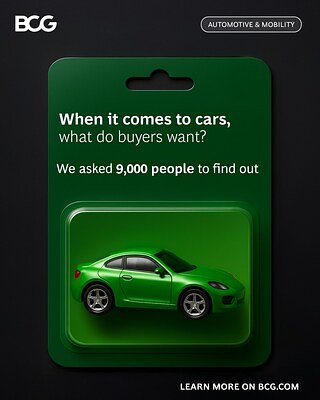
Luxury Frontiers: Investing in the High Life
A seismic shift is underway in the automotive world. Legacy brands face disruption as consumer loyalty wanes, Chinese EV makers surge, and digital buying transforms the car-buying experience.
The End of the Road for Automotive Loyalty? Shifting Sands Reshape the Industry
DETROIT – For decades, automotive brands cultivated fiercely loyal customers. But a new report, coupled with surging competition and evolving consumer behavior, suggests those days are fading fast. A study released this week by BCG and NielsenIQ-GfK reveals a dramatic shift in car buyer priorities, signaling a potential reshaping of the $3 trillion global automotive market.
The report, which surveyed over 9,000 consumers across ten countries, paints a clear picture: traditional brand loyalty is eroding, consumers are increasingly open to new entrants – particularly from China – and digital convenience is no longer a ‘nice-to-have,’ but a ‘must-have.’
“We’re seeing a fundamental break in the old rules of the game,” says a senior automotive analyst, speaking on background. “Consumers aren't sticking with brands out of habit anymore. They’re making rational decisions based on value, technology, and convenience.”
The Rise of the Challenger: China’s Automotive Ascent
For years, Chinese automakers were largely dismissed as low-cost producers. Now, they’re aggressively targeting the global EV market with increasingly sophisticated and well-equipped vehicles. The BCG report confirms what many industry observers have suspected: Chinese EV makers are gaining traction with consumers, particularly in Europe and South America.
“The quality and technology coming out of China have improved dramatically,” says a supply chain expert. “They’re offering compelling vehicles at competitive prices, and consumers are taking notice.” Data from Automotive News Europe and Statista support this assertion, highlighting significant market share gains for Chinese brands like BYD and Nio in key regions.
The surge isn't without its challenges. Regulatory hurdles and geopolitical tensions remain significant obstacles. However, the momentum is undeniable. Legacy automakers are now scrambling to adapt, investing heavily in EV technology and exploring strategic partnerships to compete.
Digital Disruption: The Transformation of the Car-Buying Experience
The traditional dealership model is also facing disruption. Consumers are increasingly embracing online car buying, driven by convenience and transparency. Reports from J.D. Power and Cox Automotive show a clear shift towards digital platforms, with a growing percentage of buyers completing the entire purchasing process online.
“Consumers want a seamless, hassle-free experience,” explains a retail analyst. “They want to be able to research, compare, and buy a car from the comfort of their own home.” This trend has been accelerated by the pandemic, forcing dealerships to invest in online capabilities and embrace new technologies.
Carvana and Vroom, pioneers in the online car retail space, have demonstrated the viability of this model. While not without their challenges, these companies have proven that consumers are willing to buy cars online, paving the way for traditional automakers to follow suit. Several established brands, including Tesla and now many others, are now offering direct-to-consumer online sales, bypassing the traditional dealership network.
The Loyalty Paradox: What’s Driving the Shift?
The erosion of brand loyalty isn’t simply a matter of consumers being fickle. Several factors are at play. The rise of EVs has leveled the playing field, reducing the differentiation between brands based on engine technology. Consumers are also more informed than ever, thanks to the proliferation of online reviews and comparison tools.
“Consumers are doing their homework,” says a marketing consultant. “They’re not blindly loyal to any particular brand. They’re looking for the best value, the best technology, and the best overall experience.”
Furthermore, the subscription model is gaining traction, offering consumers an alternative to traditional car ownership. This shift towards access over ownership further weakens brand loyalty, as consumers are less invested in a particular vehicle.
Navigating the New Automotive Landscape
The automotive industry is at a critical inflection point. Legacy automakers face a daunting challenge: how to adapt to a rapidly changing market and regain the trust of consumers. Several strategies appear promising.
- Invest in EV technology: The transition to electric vehicles is inevitable. Automakers must accelerate their EV development efforts and offer compelling electric vehicles at competitive prices.
- Embrace digital transformation: Automakers must invest in online sales platforms and create seamless digital experiences for consumers.
- Focus on customer experience: Automakers must prioritize customer satisfaction and build lasting relationships with consumers.
- Explore new business models: Automakers must consider subscription models and other innovative business models to meet evolving consumer needs.
The future of the automotive industry is uncertain. However, one thing is clear: the old rules no longer apply. Automakers that embrace change and prioritize the needs of consumers will be best positioned to thrive in the new era.
The coming years will be a defining moment for the industry, as legacy players battle new entrants and compete for the hearts and wallets of a rapidly evolving consumer base. The race is on to redefine automotive loyalty in the 21st century.
